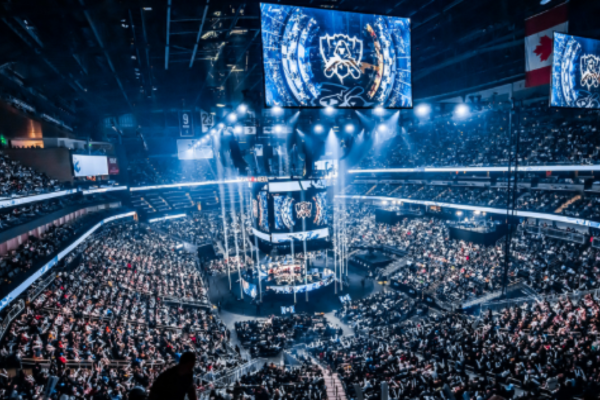From Niche to Mainstream: The $2.5 Billion Revolution Transforming Competitive Gaming
by Barsha Bhattacharya Technology 12 February 2025

The packed arena in Singapore erupts as a 19-year-old from Oslo clinches victory in Valorant Champions 2024, securing a winner’s purse larger than Wimbledon’s singles championship. Welcome to the world of competitive gaming!
Meanwhile, Saudi Arabia’s Public Investment Fund finalizes a $210 million deal for a South Korean Overwatch franchise. This isn’t speculative fiction, it’s today’s eSports reality, where global revenues now rival Formula 1 racing. So, the numbers tell a stark story:
- $2.38 billion market valuation in 2024
- 577 million monthly viewers across platforms
- 46% revenue surge in mobile eSports since 2022
But beyond the staggering figures lies a complex ecosystem where traditional sports models collide with Twitch streamers’ star power and Fortune 500 brands scramble for digital real estate. So, let’s unpack the forces reshaping this arena.
Competitive Gaming For Mobiles: The Roots
PC games like League of Legends once ruled the eSports scene, but mobile gaming is now taking center stage—accounting for 38% of competitive gaming revenue.
Moreover, a prime example is Tencent’s Honor of Kings World Champion Cup 2024, which drew a staggering 87 million concurrent viewers—twice the audience of the NFL’s Super Bowl.
In addition, marketplaces like eBay and igitems, where players buy and sell Mobile Legends accounts and other mobile gaming assets, are also seeing a surge in traffic. This growth highlights a clear trend: competitive mobile gaming is more popular than ever.
Key Drivers:
The key drivers in the world of competitive gaming are as follows:
- Affordable 5G smartphones in emerging markets
- Social gaming integration (e.g., TikTok livestream tournaments)
- Simplified controls attracting casual competitors
The real dark horse? Southeast Asia’s mobile eSports scene, is projected to hit $725 million by 2025. Indonesia’s EVOS Legends recently secured $12 million in Series B funding, banking on regional Mobile Legends: Bang Bang fandom.
The Franchise Model Goes Global: At A Glance
Traditional sports owners are buying in, literally. Here’s an overview:
| Franchise Owner | eSports Team | Valuation |
| Steve Ballmer (L.A. Clippers) | FlyQuest | $65M |
| Kroenke Group (Arsenal FC) | LA Gladiators | $78M |
| MGM Resorts | Vegas Esports Ventures | $120M |
The Overwatch League’s city-based franchise system, despite early stumbles, has inspired similar structures in Rainbow Six Siege’s global circuits. Investors now favor this stability over volatile open-tournament models.
Sponsor Wars: From Energy Drinks To Blockchain
Monster Energy and Red Bull now compete with crypto platforms like FTX (post-reboot) and Metaverse land dealers for jersey real estate. The 2024 sponsorship breakdown reveals shifting priorities:
- 22%: Cryptocurrency/NFT platforms
- 18%: Automotive brands (Hyundai’s $50M League of Legends deal)
- 15%: Luxury watchmakers (Rolex enters VALORANT partnership)
Twitch megastar Ibai Llanos recently turned down a $8M annual deal from a sports drink company, opting instead for equity in a Web3 streaming platform. “Brands want cultural relevance, not just logo placement,” notes Esports Insider CEO Sam Cooke.
Web3’s Double-Edged Sword:
Blockchain’s impact splits the community:
Pros:
- Fan token platforms like Socios.com enable team governance votes
- NFT-based player cards fetching $2.3M at Sotheby’s auctions
- DAO-owned teams like Guild XYZ gaining traction
Cons:
- 62% of pros in the ESL survey cite “distraction from core gameplay”
- Failed NFT projects damaging team reputations (FaZe Clan’s 2023 controversy)
Riot Games’ experimental Teamfight Tactics NFT trophies, physical/digital hybrids with an unlockable content hint at middle-ground solutions.
Regional Battlegrounds Are Heating: An Overview
So, let’s check out how regional battlegrounds are warming up to the competitive gaming industry:
Middle East/North Africa (MENA):
- Saudi Arabia’s $38B National Gaming Strategy is targeting 250 local studios.
- Dubai’s new Esports Island complex (VR arenas, player academies) is evidence that the Middle East is welcoming competitive gaming into the fold.
Asia-Pacific:
- India’s BGMI relaunch sparks 300% mobile gaming surge.
- Vietnam’s SkyXD secures a record $4.5M seed round for cross-platform league.
Latin America:
- Brazil’s CBLOL breaks Portuguese-language viewership records.
- Mexican Regulators are now approving visas for eSports Athletes.
The Elephant In The Arena: Sustainability Issues
Rapid growth brings growing pains:
Burnout Crisis:
- 73% of pro players report mental health struggles (ASTROF study)
- Teams like G2 Esports now employ full-time sports psychologists
Revenue Concentration:
- Top 5% of streamers earn 89% of platform payouts (StreamElements)
- Emerging leagues struggle with $500K+ franchise entry fees
“We’re maturing faster than our infrastructure,” admits 100 Thieves CEO John Robinson. “Player welfare systems need to catch up to the money.”
Ensuring Integrity And Fair Play:
With the rising stakes in the world of eSports, it has become vital to ensure integrity and fair play. Both match-fixing and cheating pose dangerous threats, motivating organizers to start implementing advanced anti-cheating technologies and strict rules.
Moreover, these safeguards are essential for protecting the fiercely competitive gaming environment and upholding the trust of all stakeholders – fans, sponsors, and players.
In addition, organizations such as ESIC (Esports Integrity Commission) work closely with tournament organizers and game developers to track matches, enforce rules, and demonstrate the gaming industry’s commitment to professionalism, accountability, and transparency.
The Future of Competitive Gaming:
As traditional media giants like Disney acquire gaming studios and Apple Vision Pro enters streaming broadcasts, the lines between physical/digital fandom blur. The real win? Building ecosystems where casual mobile gamers feel as invested as Berlin esports arena attendees.
The future of competitive gaming and esports is very bright with new tournaments, technologies, and games emerging regularly. As the eSports industry is expanding, it is doing a great job reshaping how the audience views entertainment – rather experience it.
Moreover, it is no longer a fleeting trend. It is much more than a cultural movement that highlights the relationship society and technology share. For both newcomers and players, this is the best time to become a part of such a dynamic world.
So, it is safe to say that the future of competitive gaming is digital and exclusive – it marks a brand new era in engagement at a global level.



































































































